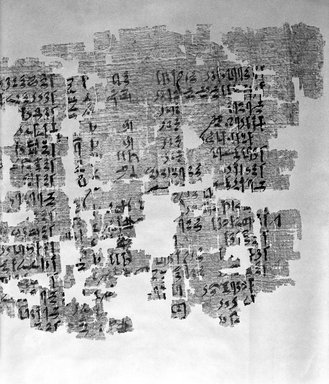
The Brooklyn Papyrus is from the 13th Dynasty that contains a list of Canaanite servants, several of which are Hebraic names.
The Brooklyn Papyrus 35.1446 is the modern term for an ancient Egyptian document that is now in the Brooklyn Museum (New York).The content appears to date from the reign of Amenemhat III into the 13th Dynasty.
https://en.wikipedia.org/wiki/Papyrus_Brooklyn_35.1446
The most important text recounts the efforts of a Thirteenth Dynasty Theban noblewoman named Senebtisi to establish legal ownership of ninety-five household servants, whose names indicate that forty-five were of Asiatic origin. The presence of so many foreigners in a single household suggests that the Asiatic population was increasing rapidly in Thirteenth Dynasty Egypt.
https://www.brooklynmuseum.org/opencoll … jects/3369
The name Šp-ra is found in a list of slaves in Egypt during the reign of Sobekhotep III (around 1745 BCE[13]). This list is on Papyrus Brooklyn 35.1446, in the Brooklyn Museum. The museum states that “Scholars assume that this is a hieroglyphic transliteration of the Hebrew name Shiphra.”
https://en.wikipedia.org/wiki/Shiphrah_and_Puah
Approximately 30 of the servants have names identified as from the Semitic language family (Hebrew is a Semitic language), but even more relevant to the Exodus story is that several of these servants, up to ten, actually have specifically Hebrew names. The Hebrew names found on the list include: Menahema, a feminine form of Menahem (2 Kings 15:14); Ashera, a feminine form of Asher, the name of one of the sons of Jacob (Genesis 30:13); Shiphrah, the name of one of the Hebrew midwives prior to the Exodus (Exodus 1:15); ‘Aqoba, a name appearing to be a feminine form of Jacob or Yaqob, the name of the patriarch (Genesis 25:26); ‘Ayyabum, the name of the patriarch Job or Ayob (Job 1:1); Sekera, which is a feminine name either similar to Issakar, a name of one of the sons of Jacob, or the feminine form of it (Genesis 30:18); Dawidi-huat a compound name utilizing the name David and meaning “my beloved is he” (1 Samuel 16:13); Esebtw, a name derived from the Hebrew word eseb meaning “herb” (Deuteronomy 32:2); Hayah-wr another compound name composed of Hayah or Eve and meaning “bright life” (Genesis 3:20); and finally the name Hy’b’rw, which appears to be an Egyptian transcription of Hebrew (Genesis 39:14).
https://debatingchristianity.com/forum/viewtopic.php?p=1071590#p1071590
